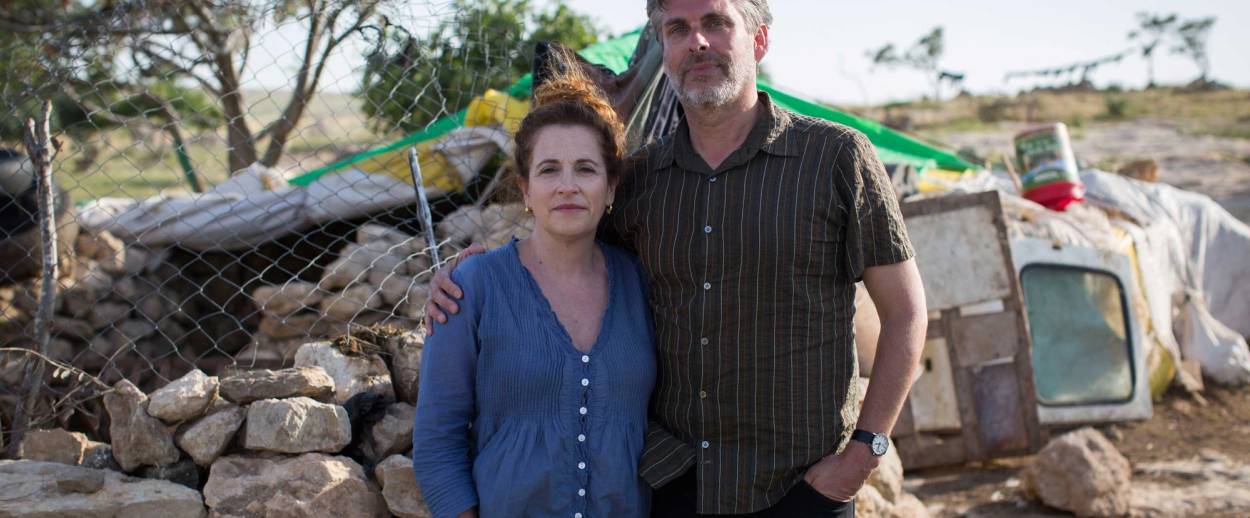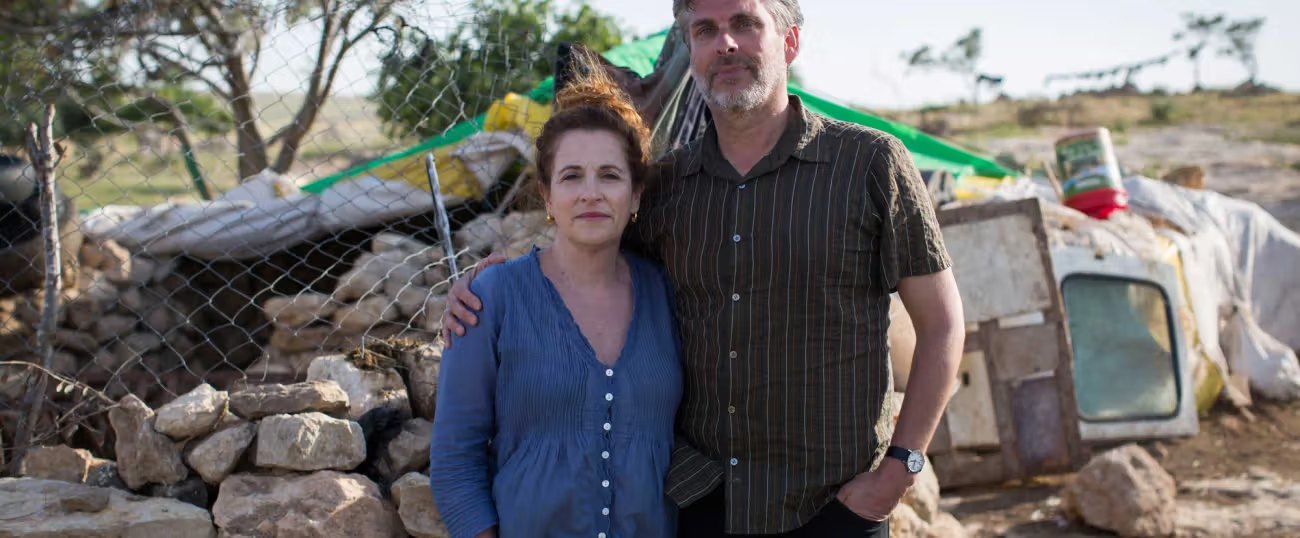The Accidental Tourists
A new anthology, edited by Ayelet Waldman and Michael Chabon, inadvertently and correctly argues that coexistence between Israelis and Palestinians is an illusion.




Writing in 1973 in the essential journal of American letters that was Playboy, Alfred Kazin wrestled with a question that has bedeviled so many readers before him and since: Why do so many gifted writers, masterfully astute observers of the human condition, turn foolish the moment they ponder politics? What drove Pound to purr for Hitler? Why was the amorous Neruda infatuated with Stalin, whom he serenaded as “the noon, the maturity of man and the peoples”? It may not be, Kazin proposed, that much of a mystery after all: Writers, at least the good ones, are humans whose pores are open to absorb all the small particles of truth and beauty that float all around us and yet that most of us, hurried and distracted, hardly ever notice. And when the pores are open, the wild stuff that moves us and that makes us crazy seeps right in.
I kept Kazin’s insight in mind when I received Kingdom of Olives and Ash, an anthology edited by Ayelet Waldman and Michael Chabon. Both are writers I admire, and so the notion of wading through a collection subtitled “Writers Confront the Occupation” gave me, an old-fashioned Israeli patriot, little pleasure. With the book’s galley came the gripes, arriving via email and social media from like-minded friends: Do we really need another meditation on the conflict? And don’t we deserve better than a host of authors who, by their own account, knew little or nothing about our ordeals before landing at Ben-Gurion airport with a tourist visa and a vengeance? And would it have killed the celebrated authors to include, among the sea of Palestinian suffering, the view from Israel as well? It’s easy to succumb to such sourness, but Saint Kazin bids us to do better—he bids us to open our hearts.
In that spirit, then, I read the book, and then sat down with Waldman and Chabon for a lively and candid conversation. Both left me with a bit of good news to my fellow defenders of the Jewish State: Kingdom of Olives and Ash is a meaningful book that deserves to be read, if not always for the reasons its editors had imagined.
In the beginning, as always, is the heart, and Waldman’s and Chabon’s is audible, beating on every page. As she landed with her charges—among them literary lights like Mario Vargas Llosa and Colum McCann—in Israel, Waldman was overwhelmed by the crush of her own emotions. “Everybody was moved,” she said, “everybody was interested, everybody was outraged, everybody was fascinated, everybody was excited, everybody was exhilarated—all these conflicting emotions. And I was having them, too, but I kept having to excuse myself and go off to the bathroom and cry. And I asked myself, ‘What is that?’ And I think that surprised me. Because I think of myself as cynical. … But I realized my emotional response was because I love Israel. I love the place, and I want it to be a part of my life.”
Having spent enough time among the ranks of the Israeli left, I recognize Waldman’s love, and her agony. Like Israeli lefties—but not, say, like the toxic creeps who rant about Israel in the anthropology departments of large American universities or the anti-Semites who pack the British Labour Party—Waldman and Chabon believe that Israel is in dire need of saving from what will ultimately be its downfall: a never-ending dominion over the Palestinian that corrodes the Jewish state’s moral fiber and irreparably corrupts its culture. It’s hardly an innovative argument, but considering the sort of bile that passes for reportage among intellectuals these days (see under: Blumenthal, Max), it’s an excellent point of departure, and one that Israel’s ardent supporters ought to acknowledge and, however grudgingly, respect.
But if you’ve read your Kazin, you know that open hearts are terrible tour guides: You mean to go one place, and even though your mind has laid down the most detailed maps, you find yourself walking in a completely different direction.
Take Chabon’s piece, a deeply moving account of a Palestinian man named Sam Bahour. From its gorgeous first line—“The tallest man in Ramallah offered to give us a tour of his cage”—you know you’re in the company of a terrific novelist, not a preening polemicist. The story that unfurls is every bit as haunting: The princely Bahour, born and raised in Youngstown, Ohio, to Palestinian parents, returns to the Motherland, eager to make it thrive. He starts business after business, but reality burdens him with the sort of challenges no executive could ever solve. He starts a telecommunications company, for example, only to find that Israel restricts Palestinian access to the wireless spectrum. He builds a fancy mall, and the second Intifada breaks out, severely limiting his access to essential supplies and summoning Israeli soldiers who use his half-built shopping center as a makeshift interrogation facility. Bahour perseveres and, against all odds, triumphs: The phone business and the mall are both big hits. But each time, just when others would rake in the big bucks, Bahour walks away.
Why? Chabon is honest enough to ask the question, and enough of a world-class noticer to answer it correctly: “When Sam said that Palestinians’ problem was being too resilient, I saw that accomplishments of this nature—accomplishments like Sam’s—were not merely futile; secretly they served Israel’s strategic goals,” he writes. “Under occupation, every success was really a failure, every victory was a defeat, every apparent triumph of the ordinary was really a gesture empty of any significance apart from reinforcing the unlimited power of Israel to make it.”
As a political argument, this is humdrum. As a novelist’s insight, it’s profound: We cultivated Westerners may speak of coexistence and reconciliation and the peace process, but the men and women wrestling on the ground, Palestinians and Israelis alike, don’t see it that way. They don’t want the pale and deracinated suburban charm of life in Malmo or Skokie; they want victory, which means the other side has got to go.
Over tea at a lovely hotel in downtown Manhattan, Chabon and Waldman rejected this reading, but any avid reader of politically-minded Hebrew literature will have no trouble placing Kingdom of Olives and Ash in a long tradition of nationalist writing. With some exceptions, Israeli leftists have portrayed Palestinians as little more than abstractions. In My Michael, for example, Amos Oz’s heroine, Hannah Gonen, cools to her Jewish geologist husband and fantasizes instead about a torrid affair with Arab twins, who she imagines will kill and copulate and do whatever else it is that noble savages do. The Israeli right was never quite so excitable: Leaf through Jabotinsky’s oeuvre, for example, and you’ll find little but deep respect for the Arabs. The father of Revisionist Zionism saw his adversaries as equals, and assumed that just as he would fight to the death for his homeland, so would the Palestinians. From these differences stem the divergent proposals concerning the future of the conflict: Those who have always gravitated toward metaphors talk about peace and understanding, while those who have always regarded the enemy as an equal brace for a conflict that will not end until one side is vanquished. The first group believes the conflict began in 1967, when Israel took control of Judea and Samaria and its Palestinian population; the second argues that 1967 is largely irrelevant, as, for that matter, is 1948—if you’re looking for a historical starting point to the conflict, your best bet is roughly 1882, when the first large wave of Jewish immigrants, dubbed the First Aliya, launched the return of Jews to the Promised Land.
The Palestinians Chabon, Waldman, and their friends profile seem to understand this inherently. The occupation they lament isn’t just the clumsy machinery that sets up the checkpoints and dispenses the permits; it’s metaphysical, a constant reminder that another people has taken root in their preserve and that for ordinary life to resume, the others must cease to be. This is why Palestinians and their sympathizers still consider Gaza occupied, 12 years after the last Jew departed from the strip. And it’s why so many hold the keys to the houses they’d fled in the course of Israel’s War of Independence, the Palestinian Nakba. Which, sadly, makes the Palestinian predicament more profound: It is a tragedy no international agreement could ever really amend. No multilateral accord could ever heal the pain of a fallen homeland, a loss that has propelled us Jews forward for centuries. We did not abandon our yearnings until we were able to once again reclaim our ancestral turf, and neither will our neighbors.
Thank heavens, then, for our fine writers, who delivered to us these portraits in despair and defiance instead of another bloated screed. We can’t afford more empty talk of the peace process, or more morally decrepit attempts—like Oslo the play or Oslo the accord—at pretending like this existential struggle is just one John Kerry away from a happy ending. We’re long overdue for a smarter, more productive argument about the conflict, and whether you swing left or right, Kingdom of Olives and Ash is a fine place to start. You may abhor, as I do, its authors’ politics, but you oughtn’t ignore the people they portray. They are real and clear and beautifully rendered, and so is their message: The war goes on.
***
Like this article? Sign up for our Daily Digest to get Tablet Magazine’s new content in your inbox each morning.
Liel Leibovitz is editor-at-large for Tablet Magazine and a host of its weekly culture podcast Unorthodox and daily Talmud podcast Take One. He is the editor of Zionism: The Tablet Guide.